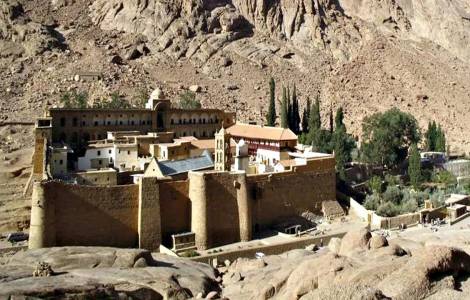
by Nikos Tzoitis
After fifteen centuries of autonomy, the Orthodox Monastery of St. Catherine on Mount Sinai has passed into the hands of the Egyptian State, according to a ruling issued by the Ismailia court. The measure has generated strong reactions and deep concern in the ecclesiastical and international spheres for the future of the monastery and its monastic community.
The monastery on Mount Sinai was founded in the 6th century A.D. by Emperor Justinian, and it has survived wars, conquests, and persecutions thanks in part to its status as a Vakuf, a sacred site to be protected according to Koranic tradition, and by the Bedouins of the Sinai Desert. UNESCO had included it among the monuments recognized as World Heritage Sites.
The monastery's priceless treasures—icons, manuscripts, relics, libraries, and properties—were managed by the twenty monks of the local monastic community, who enjoyed broad autonomy within the Greek Orthodox Patriarchate of Jerusalem.
According to the ruling issued by the Ismailia Court on Wednesday, May 28, the monastery’s assets are effectively confiscated and placed under the management of the Egyptian state, while the monks face access restrictions to certain buildings. Their continued presence in the monastery is allowed only for religious purposes and under conditions set by the new state owner.
The website orthodoxia.info described the decision of the ruling as "one of the most serious violations of religious and individual freedoms in recent centuries," carried out during a time of great turmoil in the Middle East.
The ruling, which effectively strips the monastery of its autonomy, follows a prolonged period of legal disputes and judicial actions aimed at challenging the monastery’s administrative independence.
Some Egyptian officials have justified the measure as an act of protecting the monastery’s cultural heritage. Archaeologist Abdel Rahim Rihan argued that the monastery’s real estate falls under cultural heritage laws and that the implementation of the court decision ensures its promotion for the benefit of “world heritage and the monks.” The monks, however, describe the ruling as a de facto expulsion from their own monastery.
The decision controversially concludes the long-standing legal offensive by the Egyptian state against the monks of St. Catherine’s—an effort that has been ongoing, in varying intensity, since the time of the Muslim Brotherhood-led government, with the goal of bringing the monastery under state control.
According to some analysts, the ruling reveals that even President Abdel Fattah el-Sisi may be unable to control certain elements within the so-called “deep state,” some of which are linked to Salafist groups.
Cairo must now manage a diplomatic crisis with Greece, which reacted harshly to the government action concerning the Monastery. This comes at a time when Egypt is at the center of turbulent developments in Palestine, with implications for the Sinai Peninsula—an area where jihadist factions have operated and previously threatened the monastery, even carrying out armed attacks.
The ruling also weakens the Monastery’s position in various civil disputes it was engaged in, including cases involving adverse possession.
The monks have reacted strongly. An international campaign is already planned to raise awareness and inform churches and other religious communities, with the goal of revoking the decision.
The reaction of the Greek Orthodox Archbishop of Athens Ieronymos was immediate. “I do not want to believe, and I cannot believe,” Ieronymos declared, “that Hellenism and Orthodoxy are once again undergoing a historic ‘conquest’.” He added, “This spiritual beacon of Orthodoxy and Hellenism - he added - is now facing a question of survival." (Agenzia Fides, 30/5/2025)